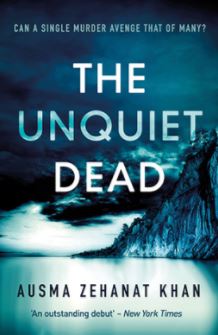A harrowing debut novel, The Unquiet Dead is measured, disturbing and masterful.
Here’s the publisher’s blurb:
One man is dead.
But thousands are his victims.
Can a single murder avenge that of many?
When Christopher Drayton’s body is found at the foot of the Scarborough Bluffs, Detectives Esa Khattak and Rachel Getty are called to investigate his death. But as the secrets of his role in the 1995 Srebrenica Massacre surface, the harrowing significance of the case makes it difficult to remain objective. In a community haunted by the atrocities of war, anyone could be a suspect. And when the victim is a man with far more deaths to his name, could it be that justice has at long last been served?

This is such an important, impressive book that to try and sum it up in a sentence would be significantly naïve; but the concept my mind kept coming back to as I worked through it was that of complex layers. From the contrasting characteristics of, and the relationship between, Esa Khattak and Rachel Getty; to the measured and intelligent way that Khan has interwoven the history of not just the Srebrenica Massacre, but the horrific atrocities of the wider Bosnian War; The Unquiet Dead is as much a book of our time as any I have ever read.
The Plot
The plot centres on the death of Christopher Drayton, a known and well-liked resident of Scarborough Bluffs in Ontario, Canada. From what seems on the surface to be a straightforward accident, we are introduced to Khattak, Head of the Community Policing Service, for reasons which are initially not entirely clear. With Drayton as the anchoring piece of the puzzle; Esa and his Sergeant Rachel gradually unravel the dark and complex truth surrounding his past, his involvement at Srebrenica, and his death.
The Characters
Detective Esa Khattak and Sergeant Rachel Getty are a well-rounded and intriguing pair. While each shows the utmost respect for the other, the reader is privy to private histories and secrets that they keep hidden, never allowing the other a view into their home lives. For Rachel’s part, her troubled relationship with her parents and her estranged brother create an undercurrent of heightened tension when we are finally allowed to step through the door of the family home with her. Khattak, calm and level-headed throughout his professional duties; harbours a widower’s pain below the surface. Where Khattak maintains (for the most part) a cool, reserved demeanour, Rachel makes no effort to mask her beliefs and thought processes, dealing in hard truths as opposed to the complicated impulses of humanity.
“… It was the first time she’d heard Khattak speak with such emotion. He wasn’t a man who dealt in ultimate truths; as she did, he traversed the underground cities of doubt and discrepancy where human frailty revealed itself in layer upon layer of incongruity.”
As with all characters in this story, Khattak is a complicated individual; and where we see him falter and are exposed to some of his own flaws; it is Rachel’s voice that both he, and we, hear in response.
His religion is an important element of the story, but the fact that he is Muslim is never laboured over, or exploited.
The spectre of the Bosnian war is expertly woven into the modern-day narrative, flashbacks mingled with snippets of letters from actual, real-life testimonials of survivors. It is harrowing to consider that the events referred to throughout the book, culminating in the mass killings in ‘safe area’ Srebrenica, were as real as you or I. A significant chunk at the end of the novel is dedicated to all of these references: where they were taken from, whose they are, and where the reader can find out more about the events.
A simple and neat ending would not fit a book as complicated as this, and this is not what the reader gets. What we do get, rather, is a contemplative and masterful piece of prose which you’ll reflect on for long after you’re turned the last page.
Author Bio
Ausma Zehanat Khan holds a Ph.D. in International Human Rights Law with a research specialization in military intervention and war crimes in the Balkans. Ms. Khan completed her LL.B. and LL.M. at the University of Ottawa, and her B.A. in English Literature & Sociology at the University of Toronto. She practiced immigration law in Toronto and has taught international human rights law at Northwestern University, as well as human rights and business law at York University. She is a long-time community activist and writer, and currently lives in Colorado with her husband. The Unquiet Dead is the first of her novels to be published in the UK.

Beautifully written review. Love the presentation of your site too!
LikeLike
Thank you! 🙂
LikeLike